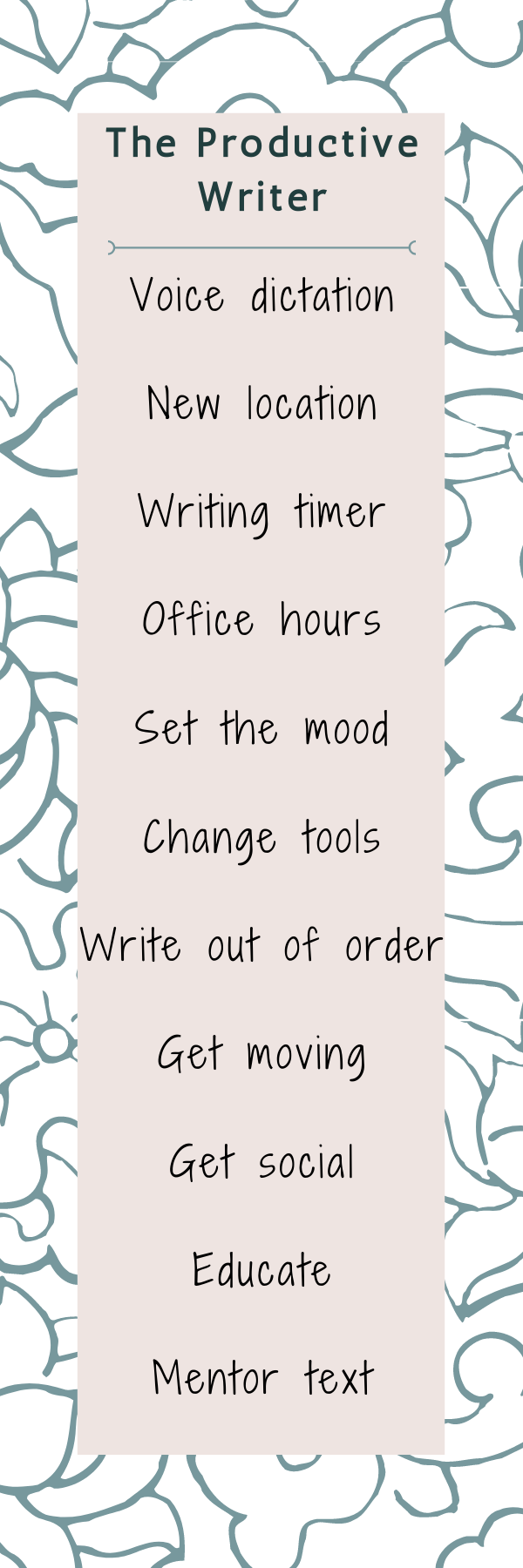A Complete Guide To Being A More Productive Writer
13 Ways to Change Up Your Writing Routine
If you have been around the writing community for even a nano, no doubt you have heard the writing advice - Just Write! It is simple advice. Easy enough for anyone to follow. Or is it?
I have moments where the words do not surface. The scene falls flat. The characters lock their doors, put on their VR headsets, and refuse to talk to me or answer my questions. I want to be writing, but something is off. Does that ever happen to you?
Do you sometimes struggle with lack of inspiration, boredom, or burnout? Or maybe there are distractions in your writing zone, stifling your creative flow. If you want to take charge of the situation and ‘Just Write’, then keep reading to see how you can be a more productive writer TODAY!
What’s the point?
This post is not about those times when you actually do need to hit pause and take a break. Sometimes, with everything going on around us, we need a writer break. We have to refill our creative wells because only muck flows from a dry well. Nothing runs correctly without proper maintenance, including you. Take care of yourself. We need your stories. To read tips on how to have a productive writer’s break go Here.
The point is, this is a Writer’s Reference Guide for those moments you need to change things up right now to help the words form sentences, form paragraphs, form chapters, and so on.
The number one thing to keep a productive writing life is to establish routines. Make a plan for when, where, and how you will write. However, your established writing routine might not always work for you. This guide is about doing something different. Do not sit there staring at the blank computer screen, just waiting. Make a change to your writing routine and watch the words flow onto the page.
1. Try voice dictation and get more words in per writing session.
One of the best programs for this feature (and I’ve researched a lot of programs) happens to be FREE! Google Docs. To access this feature on your computer: In a Google Docs document, go to the Tools Tab and select Voice Typing.
Voice Typing on Google Docs is even easier from your phone app: Open your Google Docs app and go to your document. Tap the microphone in the bottom right-hand corner. Start writing.
2. Try writing in a new location.
A different perspective can inspire and introduce new sensory stimuli which can bring a new direction to your writing. This could mean moving to another room or another building. I recently discovered that my grocery store had a large balcony with worktables that at certain times of day, remained empty and quiet.
3. Set a writing timer.
You can set an actual timer or use block scheduling on your calendar. The TickTick app has an easy-to-use Pomodoro timer. Start with trying to write for small amounts of time, like 10 minutes. Work your way up to 30 minutes or even an hour of uninterrupted writing time. Read more about the Pomodoro Method and my Ultimate Hacks for Writer Focus Here.
4. Establish office hours.
Let everyone in your household know not to disturb you during writing time. Establishing office hours, even if you work from home, can free you of unnecessary interruptions. This might mean you also need to put your phone in another room when you are in the writing zone.
5. Set the writing mood.
Tidy up your workspace and engage the senses with inspiring pictures, motivating music, and your favorite drink/snack. Change this up from time to time. I will always have fond memories of the scenes I wrote during my obsession with the Only Murders In The Building Soundtrack.
6. Change tools: Write on a different device.
If you always write on your computer/laptop, try something new. You can sync Bluetooth-compatible keyboards with your phones or Ipads. You can even mirror these devices with your televisions for a big-screen writing experience. If the high-tech stuff isn't your thing, go for a freshly sharpened pencil and a new notebook.
7. Write out of order.
This one is not something I use often but it has come in handy. I find it especially useful when I'm stuck in a scene. Skipping to a different story beat is much better than staring at a blank page and waiting for inspiration. Much like hopscotch, you can skip in either direction. Those scenes at the beginning and end of the story tend to flow faster than the middle of the story. But don’t stop there. Write a prequel or a sequel. Write the scene that started it all: the childhood trauma that created the main character’s misbelief and got them in this mess in the first place.
8. Get moving.
Full transparency - sometimes I pace the room when I am working out a scene or I'll even ‘perform’ an action sequence. Please don't tell anyone, but I even sometimes dramatize the dialogue beats.
9. Get social.
Ever written a story with a writer friend or a critique group? What about writing with a family member or a non-writer? Try it. You might like it.
10. Educate to Level-up!
This is where I plug the most value-packed virtual writers conference 𝒆𝒗𝒆𝒓! WriteOnCon (See the list of 80+ exciting speakers and links in the image.) I love WriteOnCon so much, I volunteer in the PR and Marketing Department. You will also find me moderating the WriteOnCon Discord. Come hang out with me there.
11. Mentor Text
Let me start this one by telling you, in case no one has ever told you before, You Can Be Your Own Mentor! You had the true instincts that told you to start writing and you’ve been practicing. So you have skills and talent. So go read back over the first pages to find inspiration for the path of the story. Sometimes just typing anything, even if you are copying what you have already written, can spark productivity. This works when you use books of other authors as well. (Caution that this is just for inspiration, not plagiarism.)
12. Keep this list at your fingertips.
You don’t want to waste your minutes because they will turn into wasted hours, days, weeks, and months. Bookmark this post. Or print my Productive Writer Bookmark. It’s a free PDF download to help keep the list right at your fingertips and fresh in your mind so you never waste a moment wondering what to write next. So when you feel your writing could use a little pick-me-up, check back and try something different on the list. Don’t sit there staring at the blank page or computer screen. Don’t wait for the words to find you. Do something. Take charge of the words and make a change.
13. Handle your Business Efficiently
One way to increase your productivity as a writer is by being efficient with your time. This is especially true when it comes to your non-writing related tasks, like social media. I can relate to falling down a rabbit hole of doing all the things that are more business than writing craft. This is why I created the Writer Friends Challenge and Find My Writer Friends to help writers connect, find friendship, and grow on Instagram.
If you never want to run out of content ideas for social media (or you are feeling alone on Instagram or you don’t know where to start on social media) - Go Here to learn about 𝑾𝒓𝒊𝒕𝒆𝒓 𝑭𝒓𝒊𝒆𝒏𝒅𝒔 𝑪𝒉𝒂𝒍𝒍𝒆𝒏𝒈𝒆 and get a free Instagram content calendar!!
Subscribe to my Newsletter Here - for the latest Instagram updates, tips, and strategies to help all writers shine on social media. The launch for my newsletter is coming up this month. I have much to share with you.
Let’s connect!
Leave me a comment and tell me how you change up your writing routine. Let me know if you have tried any of the items on the list and which works best for you. Do you also talk to yourself and blame it on writing?
If you want to get social, come find me at all the links below. Happy writing friends!
Follow Susan:
-
2024
- Dec 8, 2024 Writing Dialogue - Prompt Palooza
- Dec 6, 2024 Writing Advice for New Writers
- Nov 29, 2024 How to Upgrade Your Writing
- Nov 25, 2024 Why Your Writing Routine Feels Slow and How to Fix It
- Jan 10, 2024 Daily Themes For Your Instagram Content
- Jan 3, 2024 Writer Friends Challenge
-
2023
- Nov 15, 2023 A Writer’s Guide to Instagram Stories
- May 15, 2023 Tough Love Advice for New Writers
- Feb 14, 2023 Build a Strong Writing Community
- Jan 12, 2023 Boost Your Instagram Reach
-
2022
- Dec 14, 2022 A Writer’s Treasure Box
- Nov 13, 2022 Scene Level Edit - Checklist for Writers
- Oct 10, 2022 Instagram Growth
- Sep 12, 2022 The Secret Instagram Strategy
- Aug 15, 2022 Line Level Edit - Checklist for Writers
- Jul 15, 2022 Tightened Prose - Checklists for Writers
- May 15, 2022 A Complete Guide To Being A More Productive Writer
- Mar 13, 2022 20 Writing Prompts
-
2021
- Jun 16, 2021 Scene Balance
- May 21, 2021 Lessons From Almost-Land or How to be Your Own Writing Mentor
- May 3, 2021 12 Quick Tips for Writing Interesting Characters
- Mar 1, 2021 Writer Friends Challenge (March)
- Feb 15, 2021 Writerly Advice - Pacing
- Jan 20, 2021 20 ‘What If’ Writing Prompts To Grow Your Imagination
- Jan 4, 2021 MGWAVES
-
2020
- Dec 13, 2020 Writer Joy - Guest Post
- Dec 9, 2020 Christmas Reading Traditions With Guest Writer Jennifer Mattern
- Aug 24, 2020 Writerly Advice - Plotting
- Jul 27, 2020 Writerly Advice - Staying Motivated
- Jul 13, 2020 Writerly Advice - Navigating Storms
- Jun 22, 2020 Writerly Advice - Core Conflict
- May 11, 2020 Revise and Resub - Should you do it?














